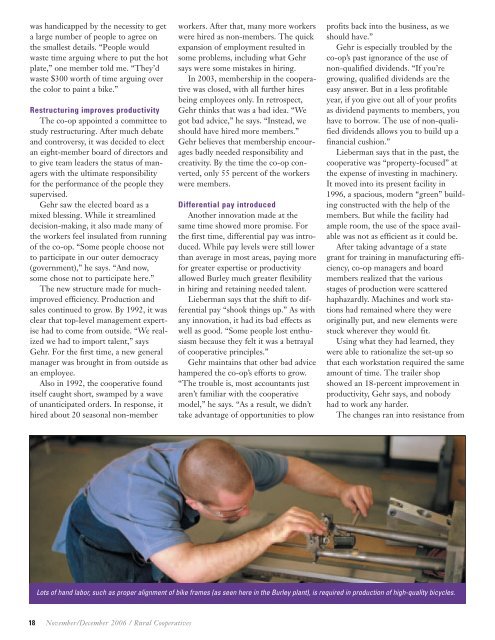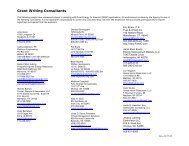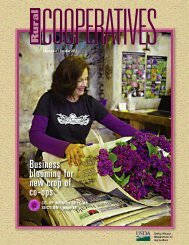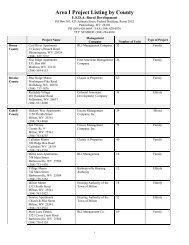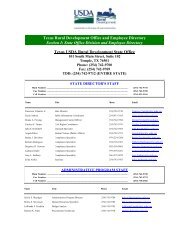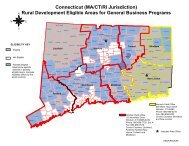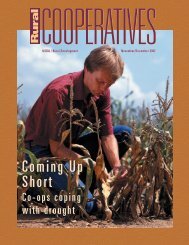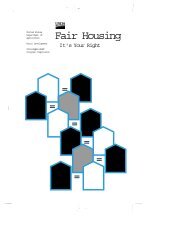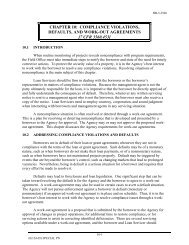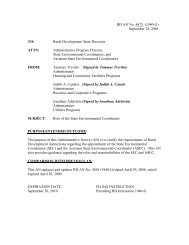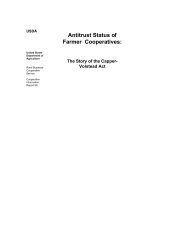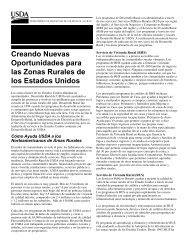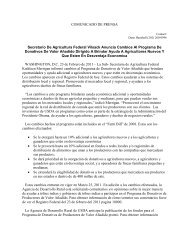How bike co-op went off track - USDA Rural Development - US ...
How bike co-op went off track - USDA Rural Development - US ...
How bike co-op went off track - USDA Rural Development - US ...
You also want an ePaper? Increase the reach of your titles
YUMPU automatically turns print PDFs into web optimized ePapers that Google loves.
was handicapped by the necessity to get<br />
a large number of pe<strong>op</strong>le to agree on<br />
the smallest details. “Pe<strong>op</strong>le would<br />
waste time arguing where to put the hot<br />
plate,” one member told me. “They’d<br />
waste $300 worth of time arguing over<br />
the <strong>co</strong>lor to paint a <strong>bike</strong>.”<br />
Restructuring improves productivity<br />
The <strong>co</strong>-<strong>op</strong> appointed a <strong>co</strong>mmittee to<br />
study restructuring. After much debate<br />
and <strong>co</strong>ntroversy, it was decided to elect<br />
an eight-member board of directors and<br />
to give team leaders the status of managers<br />
with the ultimate responsibility<br />
for the performance of the pe<strong>op</strong>le they<br />
supervised.<br />
Gehr saw the elected board as a<br />
mixed blessing. While it streamlined<br />
decision-making, it also made many of<br />
the workers feel insulated from running<br />
of the <strong>co</strong>-<strong>op</strong>. “Some pe<strong>op</strong>le choose not<br />
to participate in our outer democracy<br />
(government),” he says. “And now,<br />
some chose not to participate here.”<br />
The new structure made for muchimproved<br />
efficiency. Production and<br />
sales <strong>co</strong>ntinued to grow. By 1992, it was<br />
clear that t<strong>op</strong>-level management expertise<br />
had to <strong>co</strong>me from outside. “We realized<br />
we had to import talent,” says<br />
Gehr. For the first time, a new general<br />
manager was brought in from outside as<br />
an employee.<br />
Also in 1992, the <strong>co</strong><strong>op</strong>erative found<br />
itself caught short, swamped by a wave<br />
of unanticipated orders. In response, it<br />
hired about 20 seasonal non-member<br />
18 November/December 2006 / <strong>Rural</strong> Co<strong>op</strong>eratives<br />
workers. After that, many more workers<br />
were hired as non-members. The quick<br />
expansion of employment resulted in<br />
some problems, including what Gehr<br />
says were some mistakes in hiring.<br />
In 2003, membership in the <strong>co</strong><strong>op</strong>erative<br />
was closed, with all further hires<br />
being employees only. In retrospect,<br />
Gehr thinks that was a bad idea. “We<br />
got bad advice,” he says. “Instead, we<br />
should have hired more members.”<br />
Gehr believes that membership en<strong>co</strong>urages<br />
badly needed responsibility and<br />
creativity. By the time the <strong>co</strong>-<strong>op</strong> <strong>co</strong>nverted,<br />
only 55 percent of the workers<br />
were members.<br />
Differential pay introduced<br />
Another innovation made at the<br />
same time showed more promise. For<br />
the first time, differential pay was introduced.<br />
While pay levels were still lower<br />
than average in most areas, paying more<br />
for greater expertise or productivity<br />
allowed Burley much greater flexibility<br />
in hiring and retaining needed talent.<br />
Lieberman says that the shift to differential<br />
pay “shook things up.” As with<br />
any innovation, it had its bad effects as<br />
well as good. “Some pe<strong>op</strong>le lost enthusiasm<br />
because they felt it was a betrayal<br />
of <strong>co</strong><strong>op</strong>erative principles.”<br />
Gehr maintains that other bad advice<br />
hampered the <strong>co</strong>-<strong>op</strong>’s efforts to grow.<br />
“The trouble is, most ac<strong>co</strong>untants just<br />
aren’t familiar with the <strong>co</strong><strong>op</strong>erative<br />
model,” he says. “As a result, we didn’t<br />
take advantage of <strong>op</strong>portunities to plow<br />
profits back into the business, as we<br />
should have.”<br />
Gehr is especially troubled by the<br />
<strong>co</strong>-<strong>op</strong>’s past ignorance of the use of<br />
non-qualified dividends. “If you’re<br />
growing, qualified dividends are the<br />
easy answer. But in a less profitable<br />
year, if you give out all of your profits<br />
as dividend payments to members, you<br />
have to borrow. The use of non-qualified<br />
dividends allows you to build up a<br />
financial cushion.”<br />
Lieberman says that in the past, the<br />
<strong>co</strong><strong>op</strong>erative was “pr<strong>op</strong>erty-focused” at<br />
the expense of investing in machinery.<br />
It moved into its present facility in<br />
1996, a spacious, modern “green” building<br />
<strong>co</strong>nstructed with the help of the<br />
members. But while the facility had<br />
ample room, the use of the space available<br />
was not as efficient as it <strong>co</strong>uld be.<br />
After taking advantage of a state<br />
grant for training in manufacturing efficiency,<br />
<strong>co</strong>-<strong>op</strong> managers and board<br />
members realized that the various<br />
stages of production were scattered<br />
haphazardly. Machines and work stations<br />
had remained where they were<br />
originally put, and new elements were<br />
stuck wherever they would fit.<br />
Using what they had learned, they<br />
were able to rationalize the set-up so<br />
that each workstation required the same<br />
amount of time. The trailer sh<strong>op</strong><br />
showed an 18-percent improvement in<br />
productivity, Gehr says, and nobody<br />
had to work any harder.<br />
The changes ran into resistance from<br />
Lots of hand labor, such as pr<strong>op</strong>er alignment of <strong>bike</strong> frames (as seen here in the Burley plant), is required in production of high-quality bicycles.


